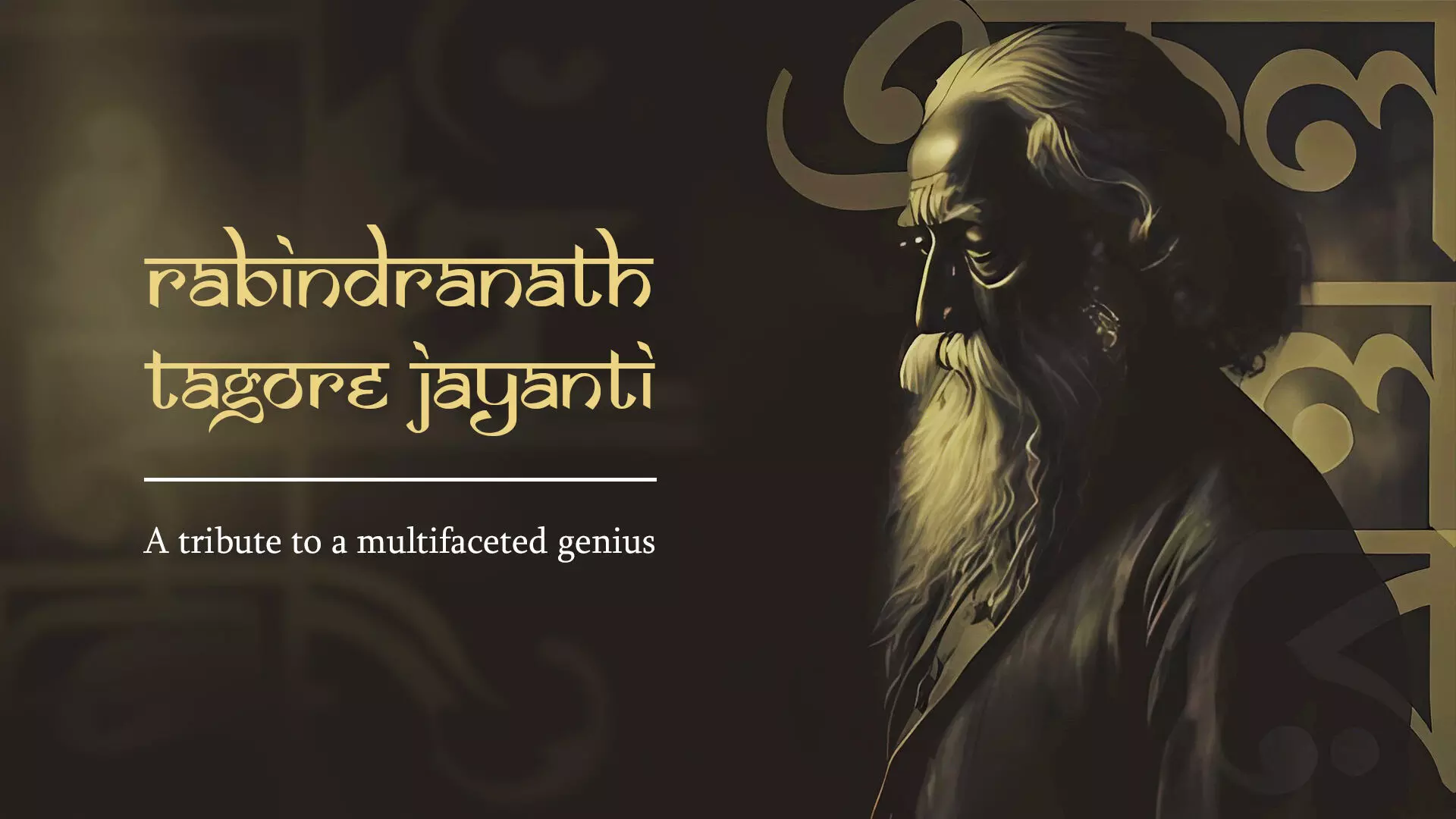Rabindranath Tagore Jayanti: A tribute to a timeless genius
The dual celebration of Rabindranath Tagore Jayanti on May 7th and May 8th, honouring the polymath's literary and cultural legacy.
image for illustrative purpose

Rabindranath Tagore, the polymath from Bengal, is celebrated worldwide for his contributions to literature, music, and art. His profound impact on Indian culture and society is commemorated annually on Rabindranath Tagore Jayanti. Interestingly, this celebration will occur on both May 7 and May 8 and the reason behind this dual celebration is rooted in history and regional traditions.
May 7th holds significance as the birth anniversary of Rabindranath Tagore, according to the Gregorian calendar. Born in 1861 to Debendranath Tagore and Sarada Devi in Calcutta (now Kolkata), Tagore emerged as one of India's most revered figures, shaping the literary landscape with his poetic brilliance and philosophical insights. On this day, people across India pay tribute to Tagore's literary legacy by organising cultural events, poetry readings, and music concerts.
However, in West Bengal, where Tagore's influence is deeply ingrained in the cultural fabric, his birthday is celebrated according to the Bengali calendar. According to that calendar, Tagore's birthday, known as Pochishe Boishakh, falls on the 25th day of the month of Boishakh. This corresponds to May 7th in the Gregorian calendar.
Rabindranath Tagore: Literary luminary and social visionary
Tagore's literary journey began at a young age, nurtured by a family deeply entrenched in the arts and culture. His prolific output spans poetry, short stories, novels, essays, and plays, earning him the moniker ‘Gurudev’ (Great Teacher). His magnum opus, ‘Gitanjali,’ a collection of poems that reflects his spiritual insights and universalist philosophy, won him the Nobel Prize in Literature in 1913, making him the first non-European to receive this honour.
In 1915, Rabindranath Tagore was bestowed with a knighthood by King George V in recognition of his literary contributions, making him the first Indian to receive such an honour. However, in response to the tragic mass killings in Amritsar, Punjab, Tagore decided to renounce his knighthood as a poignant act of protest.
Beyond his literary prowess, Tagore was a visionary and a social reformer. He believed in the power of education to uplift society and founded the unique educational institution, Shantiniketan, which emphasised learning in harmony with nature and the arts. Shantiniketan became a vibrant centre of intellectual and cultural exchange, attracting scholars, artists, and students from around the world.
Tagore's influence extended to music, where he composed thousands of songs, known as Rabindra Sangeet, which continue to resonate with audiences for their poetic beauty and emotive depth. His compositions celebrate the beauty of nature, love, and the human spirit, capturing the essence of the human experience.
Tagore's influence surpasses mere literary and musical realms; it intricately weaves into the cultural tapestry of India. His profound ideas persistently mold intellectual discourse, serving as a wellspring of inspiration for successive waves of writers, artists, and thinkers. Revered by many as Gurudeb, Kobiguru, and Biswokobi, Tagore's birthday, remembered as Rabindranath Tagore Jayanti, serves as a poignant occasion for contemplation, honour, and revitalisation of his enduring ideals.
Tagore Jayanthi Celebration
On Rabindranath Tagore Jayanti, people reflect on his teachings and pay tribute to his enduring legacy. The day is celebrated as a holiday in his birthplace, Kolkata. Schools, colleges, and cultural organisations host special events to honour Tagore's multifaceted art pieces. Discussions on his works, musical renditions of his songs (known as Rabindra Sangeet), and recitations of his poems enrich the cultural tapestry of the celebration.
Moreover, Rabindranath Tagore Jayanti serves as a reminder of the rich heritage of India and the importance of preserving and promoting its luminaries. Tagore's birthday is not merely a date on the calendar but a symbol of India's intellectual and artistic prowess.
Today, Tagore's presence is felt not only in India but also globally, where his works have been translated into numerous languages and continue to captivate audiences. His message of love, harmony, and humanism resonates across cultures, transcending barriers of language and nationality.
As we remember Rabindranath Tagore, let's not just celebrate his literary genius but also acknowledge his profound impact on society. Let us draw inspiration from his life and work to strive for a world guided by compassion, understanding, and respect for all. In honouring Tagore, we honour the spirit of creativity, enlightenment, and humanism that he embodied, leaving behind a legacy that continues to illuminate the path forward.

